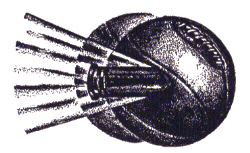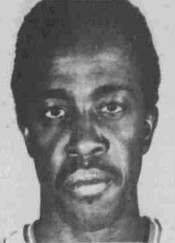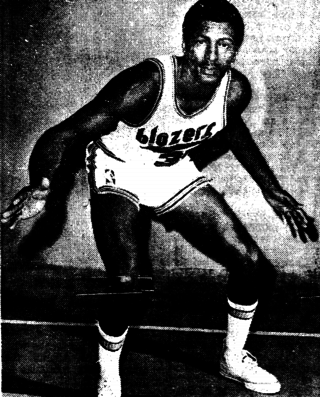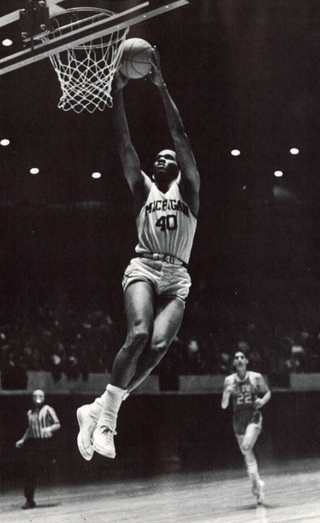
The Baltimore Bullets were a professional basketball team based in Baltimore. The Bullets competed in the American Basketball League (1944–1947), the Basketball Association of America (1947–1949), and the National Basketball Association (1949–1954). On November 27, 1954, the team folded with a 3–11 record on the season, making the Bullets the last NBA franchise to fold. Out of all defunct NBA teams, the Bullets were members of the association for the longest time and the only defunct team to win a championship.

Westley Sissel Unseld Sr. was an American professional basketball player, coach and executive. He spent his entire National Basketball Association (NBA) career with the Baltimore/Capital/Washington Bullets. Unseld played college basketball for the Louisville Cardinals and was selected with the second overall pick by the Bullets in the 1968 NBA draft. He was named the NBA Most Valuable Player and NBA Rookie of the Year during his rookie season and joined Wilt Chamberlain as the only two players in NBA history to accomplish the feat. Unseld won an NBA championship with the Bullets in 1978, and the Finals MVP award to go with it. After retiring from playing in 1981, he worked with the Bullets/Wizards as a vice president, head coach, and general manager.

Philip Chenier is an American former professional basketball player who was a shooting guard in the National Basketball Association (NBA) for ten seasons. He was also a television sports broadcaster for the NBA's Washington Wizards.
The 1968 NBA draft was the 22nd annual draft of the National Basketball Association (NBA). The draft was held on April 3, 1968, and May 8 and 10, 1968 before the 1968–69 season. In this draft, 14 NBA teams took turns selecting amateur U.S. college basketball players. A player who had finished his four-year college eligibility was eligible for selection. If a player left college early, he would not be eligible for selection until his college class graduated. The first two picks in the draft belonged to the teams that finished last in each division, with the order determined by a coin flip. The San Diego Rockets won the coin flip and were awarded the first overall pick, while the Baltimore Bullets were awarded the second pick. The remaining first-round picks and the subsequent rounds were assigned to teams in reverse order of their win–loss record in the previous season. Six teams that had the best records in previous season were not awarded second round draft picks. Two expansion franchises, the Milwaukee Bucks and the Phoenix Suns, took part in the NBA Draft for the first time and were assigned the seventh and eighth pick in the first round, along with the last two picks of each subsequent round. The St. Louis Hawks relocated to Atlanta and became the Atlanta Hawks prior to the start of the season. The draft consisted of 21 rounds comprising 214 players selected. It would also be a catalyst for the upstart rivaling American Basketball Association to either force an antitrust lawsuit against the NBA due to a leaked document that was sent to the ABA by a disgruntled ex-employee revealing the NBA's plans to show how much each team was to contribute to get the college star players to sign with the NBA teams over the ABA teams or engage in a merger between the two leagues, which eventually resulted in the NBA–ABA merger happening years later.

Rodney King Thorn is an American basketball executive and a former professional player and coach, Olympic Committee Chairman, with a career spanning over 50 years. In 2018, Thorn was inducted into the Naismith Memorial Basketball Hall of Fame.

James Jones is an American former professional basketball player who was a six-time All-Star in the American Basketball Association (ABA), one of only four players to be named an ABA All-Star six times in its nine-year history.
The 1967 NBA draft was the 21st annual draft of the National Basketball Association (NBA). The draft was held on May 3 and 4, 1967 before the 1967–68 season. In this draft, 12 NBA teams took turns selecting amateur U.S. college basketball players. A player who had finished his four-year college eligibility was eligible for selection. If a player left college early, he would not be eligible for selection until his college class graduated. The first two picks in the draft belonged to the teams that finished last in each division, with the order determined by a coin flip. The Detroit Pistons won the coin flip and were awarded the first overall pick, while the Baltimore Bullets were awarded the second pick. The remaining first-round picks and the subsequent rounds were assigned to teams in reverse order of their win–loss record in the previous season. Five teams that had the best records in previous season were not awarded second round draft picks. Two expansion franchises, the Seattle SuperSonics and the San Diego Rockets, took part in the NBA Draft for the first time and were assigned the sixth and seventh pick in the first round, along with the last two picks of each subsequent round. The draft consisted of 20 rounds comprising 162 players selected.
Albert Amos Tucker Jr. was an American professional basketball player. Born in Dayton, Ohio, Tucker is sometimes credited with inventing the alley-oop with his brother Gerald while at Oklahoma Baptist University, Shawnee, Oklahoma.

Edward R. Manning was an American professional basketball player and college and National Basketball Association (NBA) assistant coach. He was the father of former NBA player and college coach Danny Manning.

Marvin Winkler is an American former professional basketball player.
Benjamin Vallentina Warley was an American professional basketball player.
John W. Austin is a retired American basketball player.

Robert F. Riedy was an American professional basketball player in the National Basketball Association.

George Peeples is an American former professional basketball player.
Melvin Lowell Peterson is an American former National Basketball Association (NBA) and American Basketball Association (ABA) player.
Bobby Joe Edmonds was an American professional basketball small forward for two seasons in the American Basketball Association (ABA) as a member of the Indiana Pacers. He attended Tennessee State University.
Tommie J. Patterson was an American professional basketball forward who played two seasons in the National Basketball Association (NBA) as a member of the Baltimore/Capital Bullets (1972–74). He attended Ouachita Baptist University, leaving college after his freshman season to enroll in the US Army for three years, before returning to Ouchita Baptist. Patterson was selected by the Bullets in the second round of the 1972 NBA draft as the 25th overall selection.

Dennis Edward Stewart is an American former professional basketball player.
Richard Shelby Peek was an American professional basketball player. Although he was drafted by the NBA's Baltimore Bullets in 1967, Peek played in the American Basketball Association (ABA) for the Dallas Chaparrals. In 51 career games, he averaged 4.6 points and 3.9 rebounds per game.









